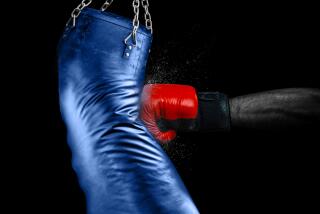There Are Few States of Grace When It Comes to Nomenclature
When California was Mexican, its citizens were called Californios. That term seems to have died with the end of Mexican rule. We are Californians now.
Its disappearance brings into question the rule, if any, by which nouns and adjectives pertaining to the various United States are formed.
Why is the basic noun used invariably as an adjective--California poppy, California sunset, California bathing beauty, and so on? Yet we residents are called by the adjectival form--Californians.
There seems to be no rule for making state names into adjective-nouns. Why is a Georgia peach not a Georgian peach? But a Georgia resident is a Georgian. Why is a Carolina moon not a Carolinian moon, when a Carolina resident is a Carolinian? And why isn’t Carolinian simply Carolinan, like Montanan?
I have always thought the silliest of state appellations is Floridian, which not only adds an unnecessary i but forces a shift in emphasis from Flor to id .
Why doesn’t Montana follow suit and call its residents Montanians?. Why aren’t Alaskans called Alaskians? Or Oklahomans Oklahomians?
Michigan defies analysis. Its residents may call themselves Michiganders, Michiganians, or Michiganites. But we have Michigan football and the Michigan wilderness.
Evidently such words arise from local custom, and are not bound by any rules of word-formation.
Kathryn Lindskoog of Orange has given some thought to the subject. She quotes a column in the Richmond (Va.) Times-Dispatch by poet-novelist Sheldon Vanauken deploring the loss of the adjective Virginian in such terms as Virginia ham and Virginia Cavaliers.
Vanauken notes that the products of nations are usually modified by true adjectives, such as French bread, English countryside, or Welsh nationalism. It would be very odd, he points out, to hear of France bread, or the England countryside or Wales nationalism. Then why not Virginian ham?
Curiously, Vanauken asserts, only Hawaii, of the United States, gives an adjectival form to its products, culture and parts: Hawaiian luaus, Hawaiian music, Hawaiian legend--the same word serving as a noun for a person of Hawaiian ancestry.
(Hasn’t he forgotten Alaska? Don’t we speak of the Alaskan malamute, the Alaskan winter, Alaskan king crab, Alaskan Airlines?)
Note that all the words for residents of American states are genderless--Californian, Vermonter, Arizonan, Kansan, Iowan, New Jerseyite. But there is no genderless word for a French person or an English person. There are Frenchmen and there are Frenchwomen. France and England do not recognize unisex.
“If we want to dignify our slipshod country with real adjectives,” suggests Lindskoog, “should New England clam chowder be called New English clam chowder? Should we speak of Connecticutian towns? Illinoisian farmers? Would the public accept New Yorkish wines? Bostonian baked beans? Mainic woods? Arkansasian travelers? Kansan wheat? Texan chili? Massachusettsian candidates? Coloradon Rockies? Indianan limestone. Oklahoman territory? Idahoan potatoes? Vermontese winters?”
She notes that Carolinian, like Canadian, has an extra i before the final an . If that were common would it not lead to Indianian limestone? Oklahomian territory? Nebraskian plains. Iowian corn?
The process by which Panama becomes Panamanian would wreak even more havoc with our states, she goes on. “It would give us Carolinanian, Indiananian, Oklahomanian etc.”
Exploring the intricacies of foreign nomenclature, Lindskoog notes that, aside from Peru, most countries’ names convert easily into short adjectives: “Germany actually subtracts a syllable to become German, and Afghanistan shrinks gracefully to Afghan. But one very small country offers three different adjectives: Netherlandic, Netherlandian, and just plain Dutch.
“In spite of such Netherlandic adjectival superfluity, however, we still have Holland gin, Holland tulips, and even Hollandaise sauce, which happens to mean Holland sauce sauce.”
Lindskoog’s invention of “Massachusettsian” and “Connecticutian” forces me to confess that I haven’t the slightest idea what the citizens of those two states are called. Surely neither of Lindskoog’s monstrosities is in use. But what words are?
My dictionary is of no use. Though it lists Vermonter, New Hampshirite, New Jerseyite, Mainer and Rhode Islander, it comes up blank for Massachusetts and Connecticut.
A reliable source (a New Englander) tells me the words are Bay Stater and Nutmegger, “but nobody outside a fourth-grade geography class ever uses them, especially not the residents.”
My nominees would be Massachusers and Connecticats.
Meanwhile New Yorker remains the best of citizen names. It is short and logical and its meaning is unmistakable. Only two things can properly be called a New Yorker. One is a magazine and the other is a resident of New York City.
Both have distinct characters. The magazine is smart, sophisticated, literary, stylish, witty and syntactically impeccable; the people are savvy, insular, outspoken, polyglot, energetic, and loyal to the Mets, the Knicks and the Yankees. The word is pronounced N’Yawkuh.
What they call Upstate residents I don’t know.
More to Read
Sign up for Essential California
The most important California stories and recommendations in your inbox every morning.
You may occasionally receive promotional content from the Los Angeles Times.










